There were no trees, just thousand-foot waves of sage. Actually, there were a few trees, isolated in little clumps, little stationary villages, but they didn’t come into play much, they were just distant decorations. My map showed there was once a railroad tunnel under the divide. We’d read about about the old railroad on the little historical marker back at the pass. We took a little side trip to investigate the tunnel. Somebody had closed the tunnel entrance 50 years ago… mostly. A large berm had been plowed up in front of it. It was an easy climb over the berm and into the tunnel. The tunnel was cold, dark and about 100 yards deep, beyond that it had collapsed. It was a hidden island oasis. Anything rare was valuable. We stepped back outside to a sky filled with angry swallows… which looked a lot like any other swallows, except for the squawking.
The trail took us up, for the first time up over 10,000 feet. Elk Mountain.. From the top, we could see a line of jagged peaks in Idaho, paralleling the divide – the Lemhi range. The Lemhis looked amazing, what was going on over in those mountains? what was the view like from there? why couldn’t we be walking over there instead? But, I thought, if had been there, surely I’d have been looking lustfully back at the divide. The place for dreamy thoughts was right under my feet.
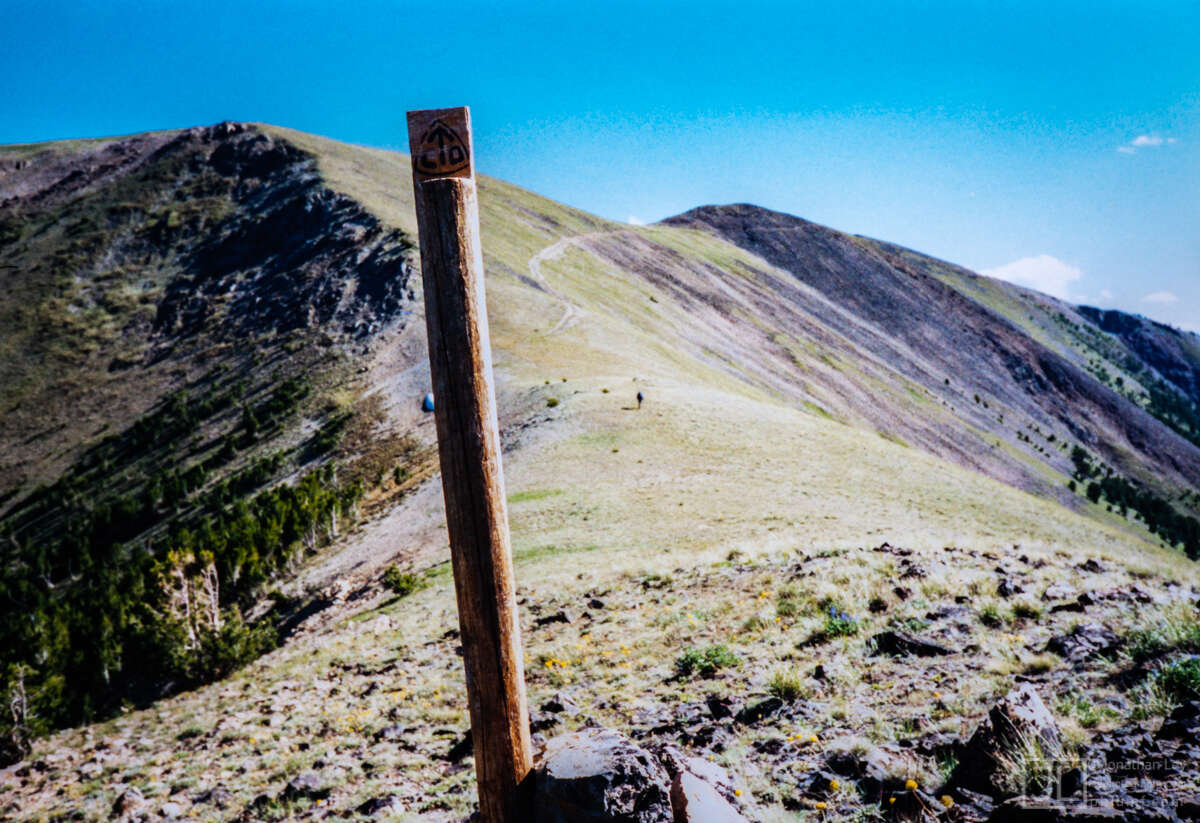
The trail continued over more rolling green-brown mountains. The land was huge, made of tiny plants and tiny rocks and a tiny two-track road with two tiny people. We picked a spot, as good as any, and enjoyed the dusk.
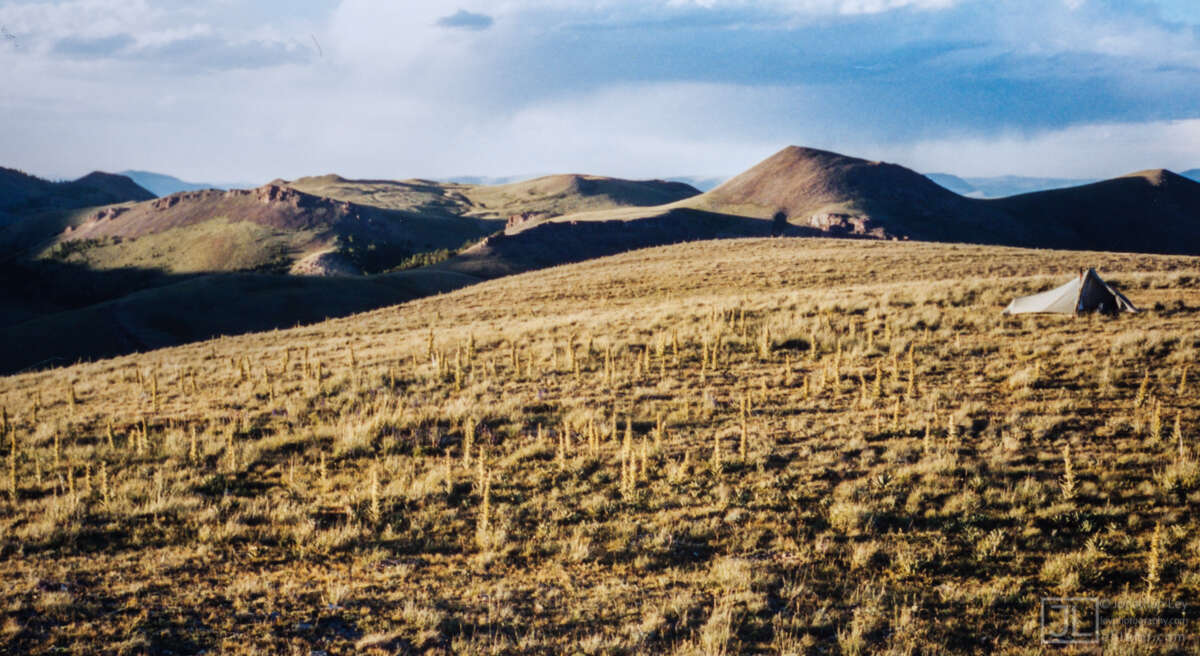
The next day continued the same – a speck of two people moving slowly over a huge land. It was hard to take it all in, to really appreciate and comprehend the views that had become so routine, the life that had become routine. We descended to a spring – pure water trickling out the base of a mountain – time for another break, back on the grass, flowers, sky, wind. Time paused for us there.
We came to another lake that was at the end of a road. A couple had parked at the lake, and they were staring through a telescope pointed at a high mountain slope. They’d spotted a few bighorn rams, relaxed bighorns. Most of the time we saw wildlife along the trail, it was running from us. It was reassuring to know that the animals got to take breaks too. The couple had come up there because, “We saw the road on a map and decided we’d discover where it went”, we had that in common.
The trail continued below the mountaintops, winding among foothills along little used roads. The high lands above us were gentle, open, and inviting – calling us to come up and explore. After a couple hours, we’d had enough, and decided to cut up to the mountaintops a few miles before the CDT did. I wandered up a creek, slowly rising, and something caught my eye.
A boulder had crashed from a cliff high above. It was filled with small fossils, about the size of gum balls. The fossils looked to be some type of ancient sea creature, a barnacle-like thing. I thought, how little we knew of that other dimension, the one of time. The fossils made the mountains look young. It had taken millions of years for them to have become rock, millions more for them to have been uplifted by geologic forces and broken off the mountainside. Yet, that rock had probably been uncovered, sitting there, since before people even existed, let alone lived nearby or hiked the CDT. We didn’t even exist in time, we only got a still photo, one that shifted almost imperceptibly during the course of our short lives.
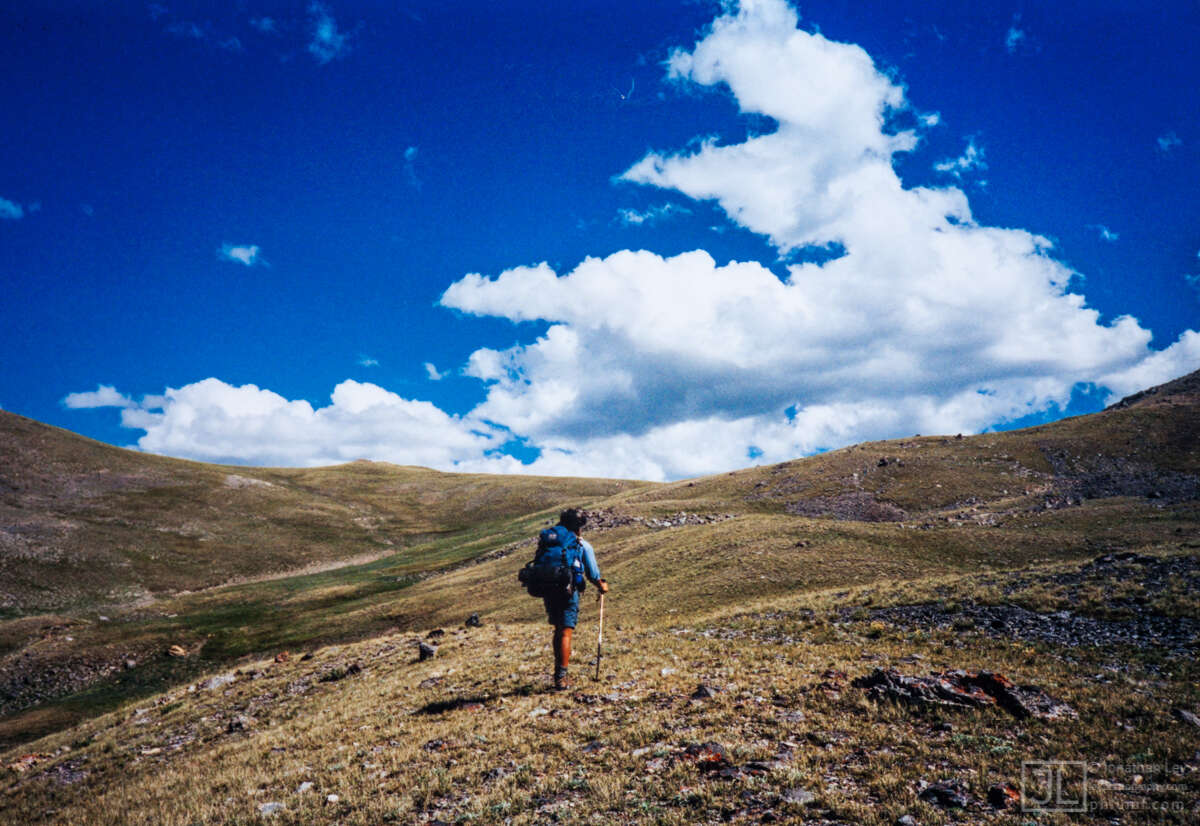
The land continued to open up, with each step, more and more of the surrounding country was revealed. Distant peaks and valleys and rivers and lakes, they slowly appeared to us. Slowly the picture changed, the scale changed, the word “far” took on new meaning. We surprised a group of about 5 bighorn rams. We’d uncovered their secret hideaway, and they reluctantly trotted off, out of sight, to another hideaway. We reached the divide, then dropped down a little to a stream to cook dinner.
It was already getting late. Where had the day gone? Our little dinner spot overlooked dozens of square miles of land. We were treated to a symphony of sounds from places near and far – a screeching hawk, yelping coyotes, bugling elk… Why was it that even the harshest language of nature was music to our ears?
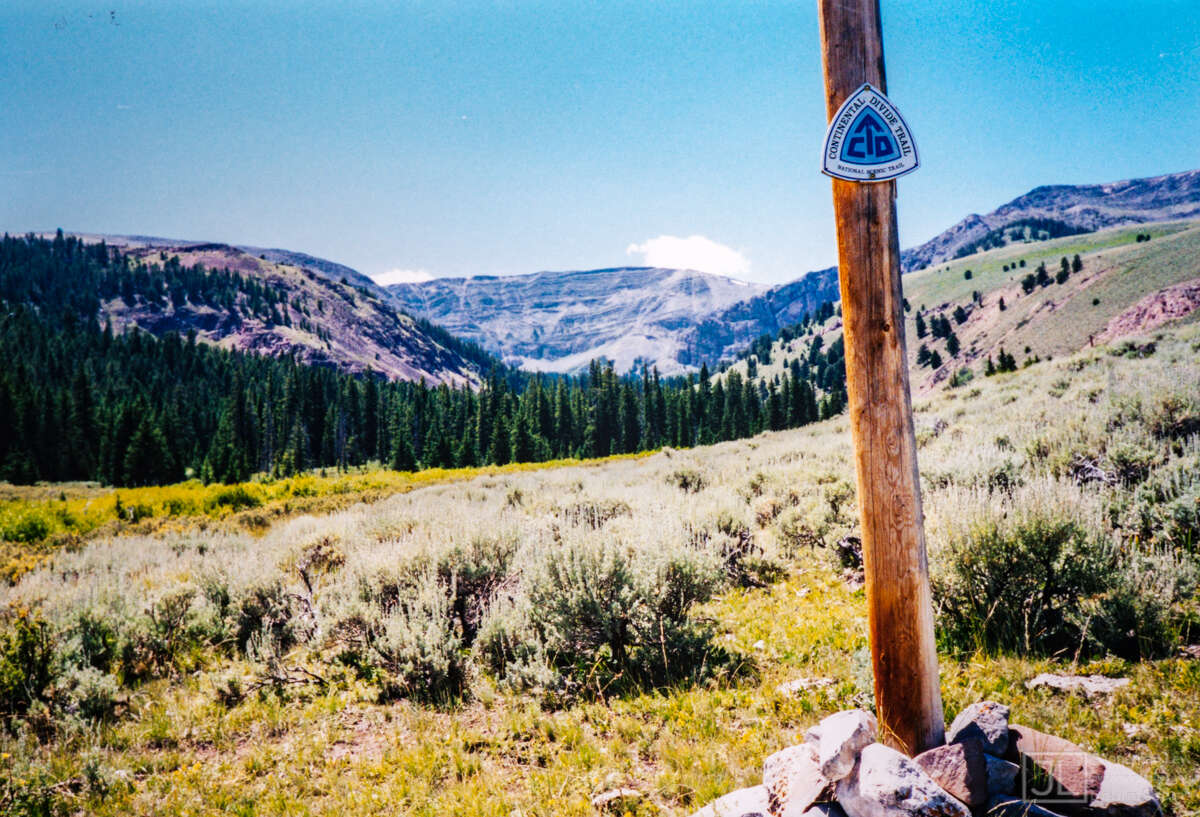
We continued, following our maps and occasional CDT signposts along the divide. We climbed to another high grassy mound, it looked as if we’d be in for another evening light show – puffy clouds were just overhead, soon the sun would dip to an orange angle that lit up their bellies. Sunset soon happened, right on schedule, but the clouds didn’t dissipate like I’d hoped. Instead, they gathered their forces.
The clouds above our heads were being drawn to the east, where a huge thundercloud was forming – a mass of low pressure. The sucking wind ripped over our grassy hilltop – taking the clouds above with it. To the north, another thundercloud was already going to work. Elk Mountain, where we’d been a couple days earlier, was being bombarded with lightning. As the sky got darker, the Elk Mountain storm intensified – one silent flash every few seconds. I began to worry, was that going to be our fate too? We were in about the worst possible position for lightning – on the top of a 9000 ft. mountain, in a landscape where the tallest plant was 1 ft high. There wasn’t enough light to see the clouds anymore. I tried to estimate their size and location by looking for stars – a big black void told me where the nearby storm was gathering. It started to rain. I just laid low and hoped for the best, I was too tired to think about moving downhill, plus, it was probably 3 miles to the nearest tree. As I drifted off to sleep, the rain let up, the wind slackened, and by morning we had blue skies. The sky hadn’t quite enough ammunition to get us.
In the morning, after a brief detour to get water from a rocky spring, we headed up Cottonwood peak. It wasn’t on the CDT, but it was on the divide. We’d been looking at Cottonwood Peak for a day, getting closer and closer… of course when we reached it, we had to go up. The summit of Cottonwood was a rounded area about 30 yards in diameter, beyond that it dropped-off, out of sight. To the southwest, a giant brown valley sat beneath the jagged peaks of Idaho’s Lemhi range, rising on its far side. To the southeast, the divide continued, becoming a series of un-navigable crags of steep loose rock. To the northeast, the mountains gave way to the big hole and the hazy green color of sagebrush. A few drips of shimmering blue were visible below us. Harkness Lakes. We’d be there in a couple hours.
We scrambled down the steep northeast slope of the mountain, the loose rocks shifted beneath our feet. The absence of a trail didn’t faze me anymore, every place was just another place to go. I realized that the whole planet was open, it was only a matter of taking enough careful steps. To where else could I lead my feet?
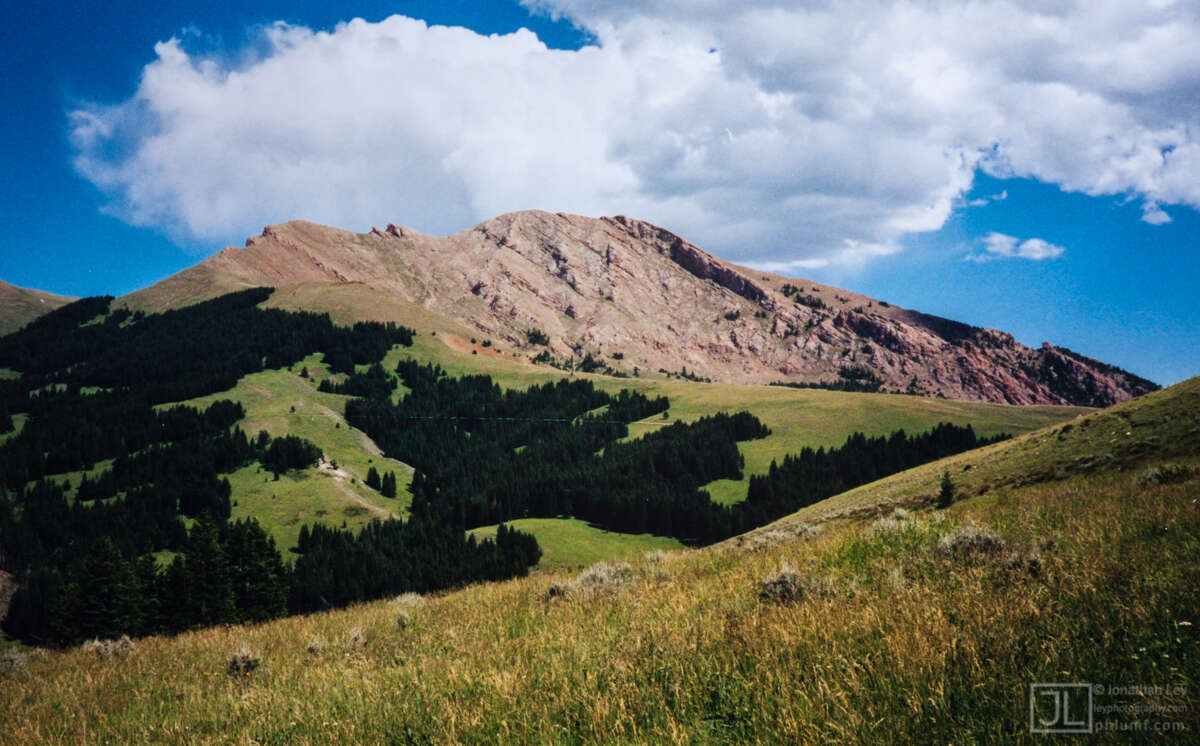
A half dozen pronghorn bounded away as we approached the little group of little lakes. We continued over more foothills as the heat of the day grew. The flies steadily built, opportunistically grabbing tastes of sweat and skin, then sticking around for more. We stopped for a break under some small shady trees. I covered myself in nylon… it may have been hot, but it was better than bugs. I couldn’t look at all of them, couldn’t focus on one individual before it was gone and another had taken its place nearby. The flies had all shapes and sizes and agendas. A freaky 2-inch long nameless alien bug, covered in antennae and probosci, slammed into Mario then sped off, in a hurry to be somewhere.
As the walk continued, I looked ahead and noticed an unmistakable pattern of black and white on the trail just ahead. It was a badger. It saw me and stomped off in the other direction, down the trail surrounded by tall grass. A mile later I saw another one… then I thought, it must have been the same one. After all, what were the odds of living an entire lifetime, never seeing a badger, then seeing two in 20 minutes?
The trail headed along a creek, up a beautiful mountain valley. Grey peaks rose high above the rounded green bottom. A deep blue sky dotted with clouds provided a perfect backdrop. It was Nichola Creek. I remembered back a few weeks ago, to that rancher we’d met – the real live cowboy. It was where he came when he came to the mountains, his “favorite place in the world”. I could see why. The trail turned away from the valley though. I wanted to go up Nichola Creek, and was sorry that I hadn’t planned to do it. It would have taken an extra half a day, and I didn’t have enough food. I felt like I’d let the cowboy down somehow, I wanted to see what he had seen, to understand a little more of that place. I promised myself that I’d return someday. Yes, that was it… a perfect reason to come back, to think about that day. Nichola Creek, I’d visit you yet. click to enlarge
We came to another lake, Deadman Lake. It was a small lake, population 4 – Mario, myself, and a father & son fishing team. We cooked our dinner, and watched the fishing. 10 seconds after every cast, Dad pulled up a trout, took the hook out out of its mouth, and threw the fish back. His son, probably 10 years old, wasn’t having much luck, and started to lose interest, as if there was something about fishing that he would never understand or appreciate as well as his Dad. “This lake isn’t stocked”, the Dad told us, “these are the same fish that the pioneers fished”. I was glad that it mattered to him, glad that he was there with his son, showing his son what mattered to him and why. It was quiet at Deadman Lake.
After dinner, we headed up another hill, another steep climb, and found a place to spend the night, back on the divide. We were just settling in when Drew came up. He’d started a half-day behind us. All that time I’d been looking around, knowing there was nobody out there, Drew had been behind, a speck in the green. How many other unknown specks were out there? Maybe weren’t as alone as I’d believed.
Drew left early the next morning, before Mario and I even started making noises. I never saw him on the CDT again.
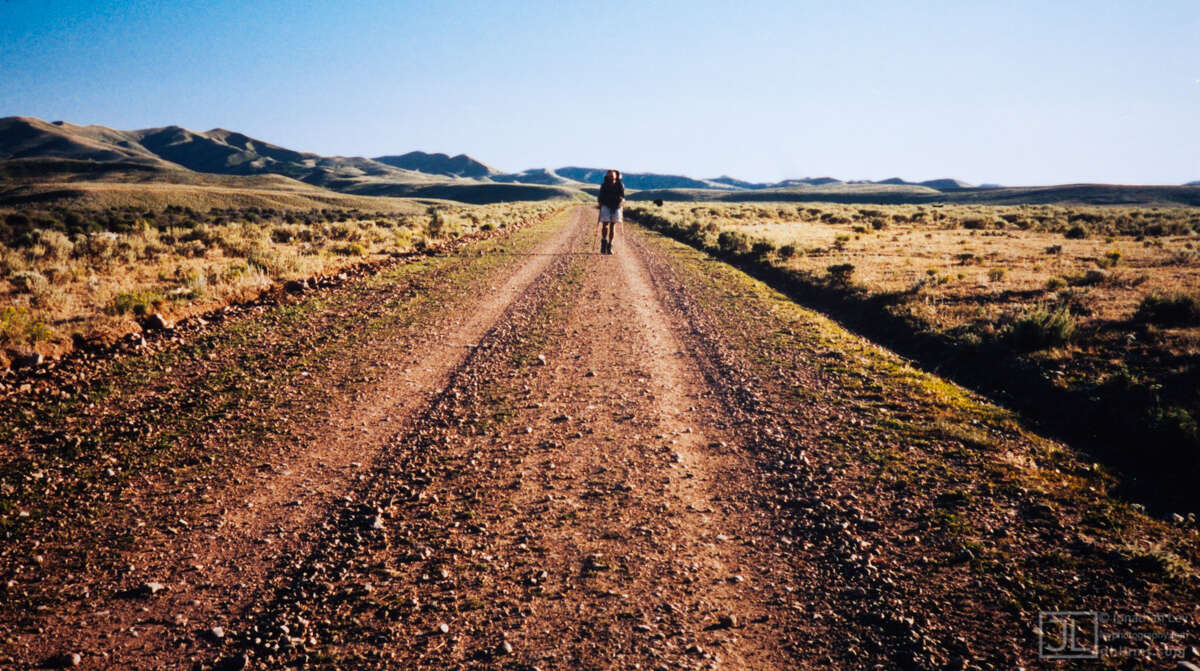
Early in the morning, we passed high above a herd of Elk doing their daily business. There were probably 40 – 50 elk of all sizes, a community of them. They were disappearing into a patch of forest, one by one. The crisp cool morning fit the elk well, I wondered what they’d be doing in the heat of the day – sitting the shade most likely – the elk were smart, they’d been there a long time. Mario and I headed toward points unknown, further exploring our home, slowly learning what the elk already knew.
I pulled off the trail and signaled to Mario that I’d see him up ahead. I didn’t need to say anything more, he understood. It was a daily ritual. I sat there, squatting above miles of empty land, making my little contribution to the earth. People had invented a thousand euphemisms for it, but it was one of the most basic things that people did, one of the things that reminded us of our fundamental natural heritage, of our legacy. What was wrong with that? In isolated shrines all over the world, people squatted, seemingly ashamed that they indeed had to poop. Everybody pooped, but discussion of it was usually met with either giggles or shudders. On the trail, it was an accepted topic of conversation. It was celebrated. A good poo meant a good hike. A scenic poo? what could be better?
We came to bannack pass, the other one… Up ahead I could see a white cliff. Limestone. It was an oddity, it stuck out, half uncovered like an ancient skeleton . I remembered the words of the man who’d sat in the dirt with me at Lemhi Pass. We had to look for the bison caves. We got to the top of the cliffs, and spread out. The cliffs themselves were something to behold, a unique frame from which to view the giant green expanse. Mario called out from behind me, “Here, I think it is here.”. A dark cave, the walls made of soft horizontal grey/white bands, snaked vertically into the ground. It was as if the wall of the nearby cliff had slightly separated from the ground behind, allowing water to slowly erode the rock. We climbed down. The walls glew with sunlight, dimly illuminating the floor. The bottom of the cave, 20 feet below the ground, smelled like an unused basement, a faint scent of stagnant moisture. The floor was covered with bones, I had no idea how old or how many. If they had been bison, somebody had already removed the horns and skulls. All that were left were vertebrae, ribs, and limbs. The bones went down to an unknown depth. I thought about a bison, getting trapped there in a winter long ago, breathing heavily, and slowly realizing its fate, calling out to its companions above, the calls becoming faint, the big animal sitting down, never to stand again, the last breath and the slow decay.
We picked up the CDT, and came to a stock tank. According to the map, we were near something called Buffalo Spring. A hose came out of the ground, and emptied into a large red tub. We found a valve hidden nearby which turned the water on. We had no idea where the water was coming from, but were too tired to worry about it. We figured, who would poison the water? and if it came from a dirty source… well… it’d be hard to catch anything to which we hadn’t already been exposed. The water tasted good, and it didn’t kill us.
The trail leading away from the spring started out nice, but within a mile, it was completely gone. My home-made maps were of no use, I had only written on them, “trail in here somewhere”. The guidebook was somewhat helpful, but, basically, we just headed toward the divide. There were a few CDT trial-posts, but no trail. The lumpy ground underfoot was hidden by thigh-high grass, every step became an experiment in stability and a test in ankle strength. Above us, a great mountain face – the Red Conglomerates – kept watch. The Red Conglomerates were like a grassy hill, with a section removed. The inside of the hill was made of rust-red banded rock. What else was hidden under these mountains? I wondered. What did they look like a million years ago? What would they look like a million years hence? I wanted to stand right there and get a fast-forward preview of the future, shards of red rock crumbling down into a heap, being covered by grass, the whole mountain melting into the countryside… Why do we have to be cursed with a human life-span?
We stopped for dinner on a windy ridge, then bushwhacked some more… luckily coming to a road-end where we camped. As darkness fell, we could hear a group of people a quarter mile away, partying, probably drinking beer around a bonfire… It was Friday night, they were out there, cramming all their living into a night they’d probably forget by morning.
The next morning, the trail disappeared into cow land. It seemed like every cow in southern Montana was crammed into that few miles. The cows had trampled paths crisscrossing all the hills. A few scattered CDT markers were placed here and there, one couldn’t be seen from another, and some had arrows pointing the wrong directions. We just followed the guidebook, followed written directions, looking for treasure. Every stream we came across was destroyed by the cows, turned into muddy puddles that had been stomped to death. We finally found a trickle of fresh water coming out of the ground, about 12 inches below, the water ran into a moist lump of cow feces.
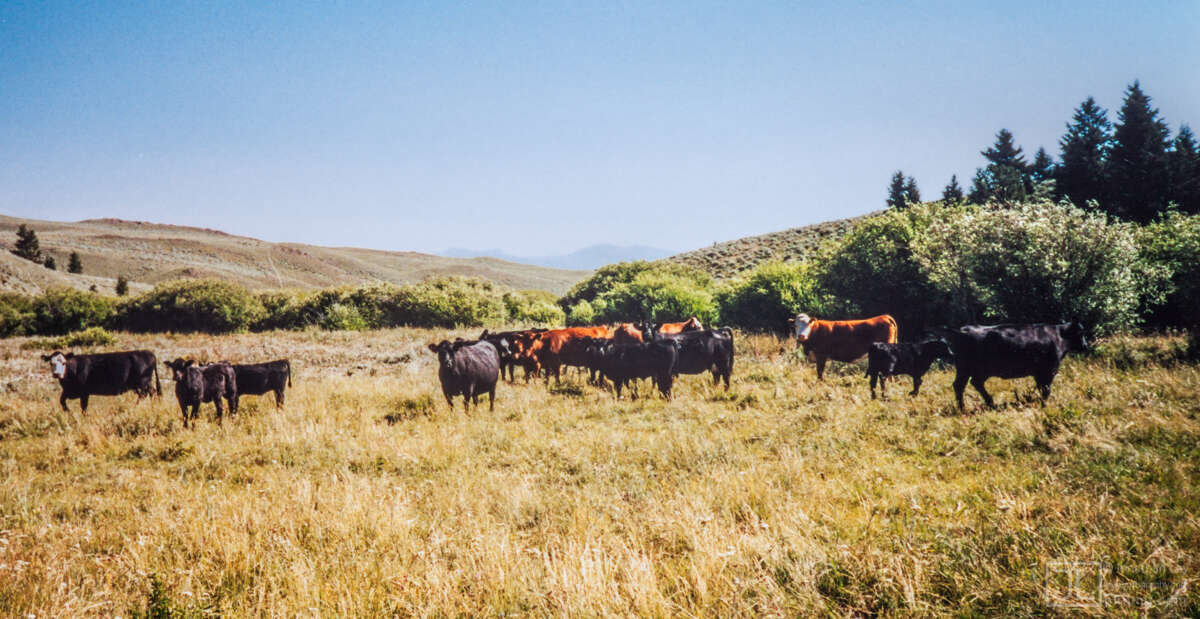
We climbed back up to the divide, smaller and smaller plants grew in the rocky soil. The rolling hills around us were all completely barren and windswept, they looked like thinly-disguised sand dunes. The wind was blowing hard from the southwest. As the walk continued, the wind intensified. The wind flowed up the slopes on the Idaho side of the divide and rolled over the top, right through us. I yelled at the top of my voice and heard nothing but the white noise of wind circling through my ears. I turned my head, and the wind ripped my hat off, ripped out the little string under my chin – the string that was supposed to keep the hat on my head. By the time I turned my head to look at it, the hat was but a speck in the blue-white sky, headed forever upward. The trail rolled up and down and up and down on bumpy soil, tracking the divide. We had to lean into the wind to keep our balance and avoid being blown into the barbed-wire fence, which was strung along our side – the Montana / Idaho border fence. We took a break just under the ridge on the Montana side, the leeward side. Below a height of one foot, there was little wind. We laid there for temporary relief. I amused myself by throwing bits of plants into the wind-stream above, watching them take off horizontally, instantly gone. An occasional grasshopper or bird whipped by, flying futilely against the current, flying backwards. Finally, the divide turned so the wind was at our back, we descended to the flatness below and ate dinner behind a parked car – a poor windbreak.
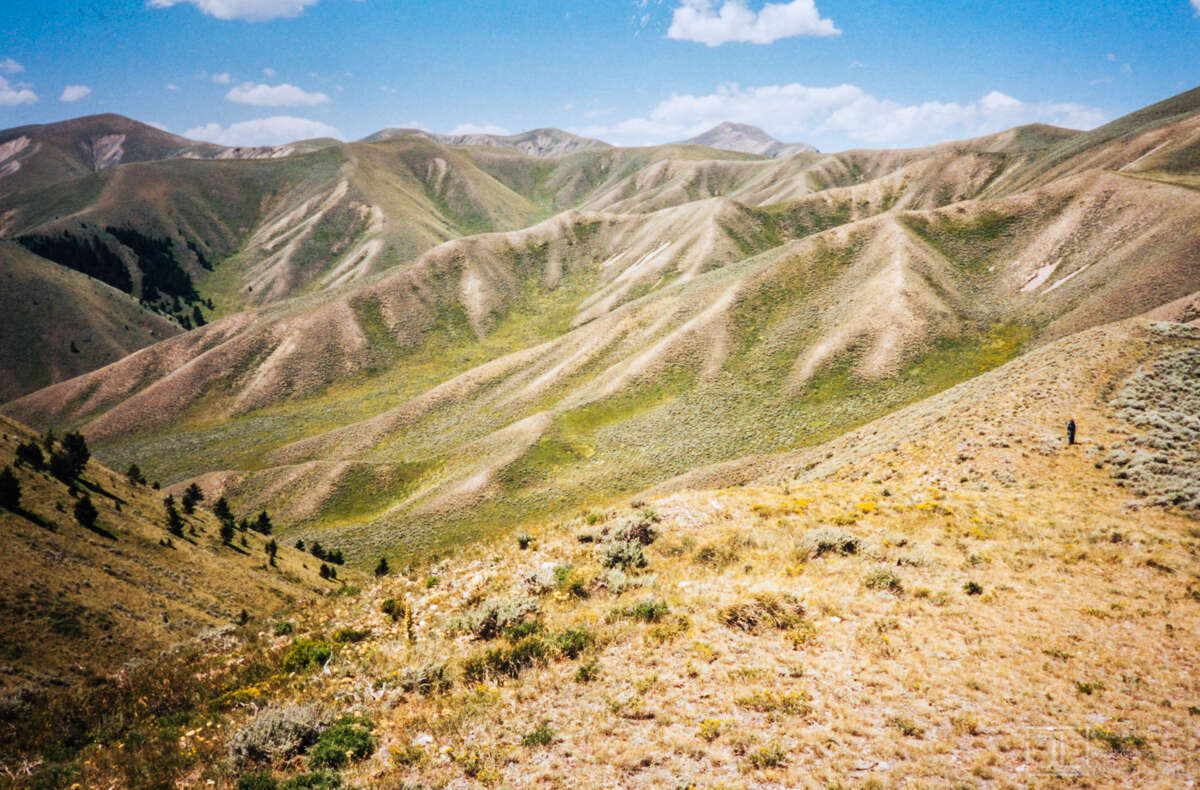
In the evening, we camped in a tiny patch of pristine green grass, it was a bit of streambed fenced off from the cow traffic. It was all that was left of the way everything once was. I tried to imagine what the land looked like B.C. (before cow). It was difficult, the face of the land had been altered too much. What wealth of beauty laid underneath the scars?
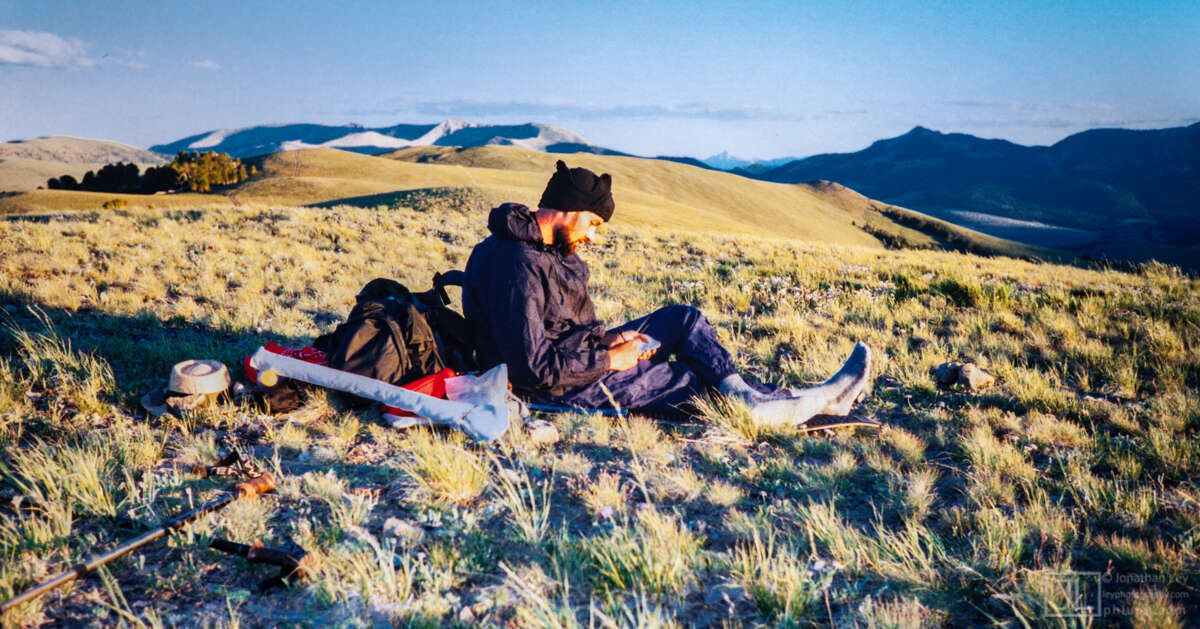
The next morning, we walked the remaining mile to the highway, the first pavement we’d crossed since Salmon. After a few minutes of thumb-waving, we had a ride. A few minutes more, and we were in Lima, Montana.
Lima was once somewhere, a railroad stop. But, the railroad had been replaced by the highway. The few cars that actually stopped in Lima were the only reason the town was still there at all. We had lunch at the cafe, an older couple from Lake Havasu sat with us… even bought us lunch. A woman at the gas station offered to help with our laundry. John and J.J. showed up, they had another hiker with them. Todd was a teacher from out east, hiking a chunk of the CDT before the summer ended. He’d started at the Canadian border with his partner, Dave, but the two of them had gotten separated somewhere in the last section.
That night, we wound up at the bar. The bar had never made the jump from railroad to highway, it still faced the tracks, surrounded by abandoned buildings. The old man who ran the bar was a relic of the old Lima. He was the living essence of the place, a personified metaphor for the town itself. “Welp”, he told me, staring off in the distance, “I’ve lived the best life I could.” He slammed his hands on the bar. He was satisfied. He knew that it was all nearly over, and in the end all that mattered was not having regrets. All things passed, nothing could be done about that.
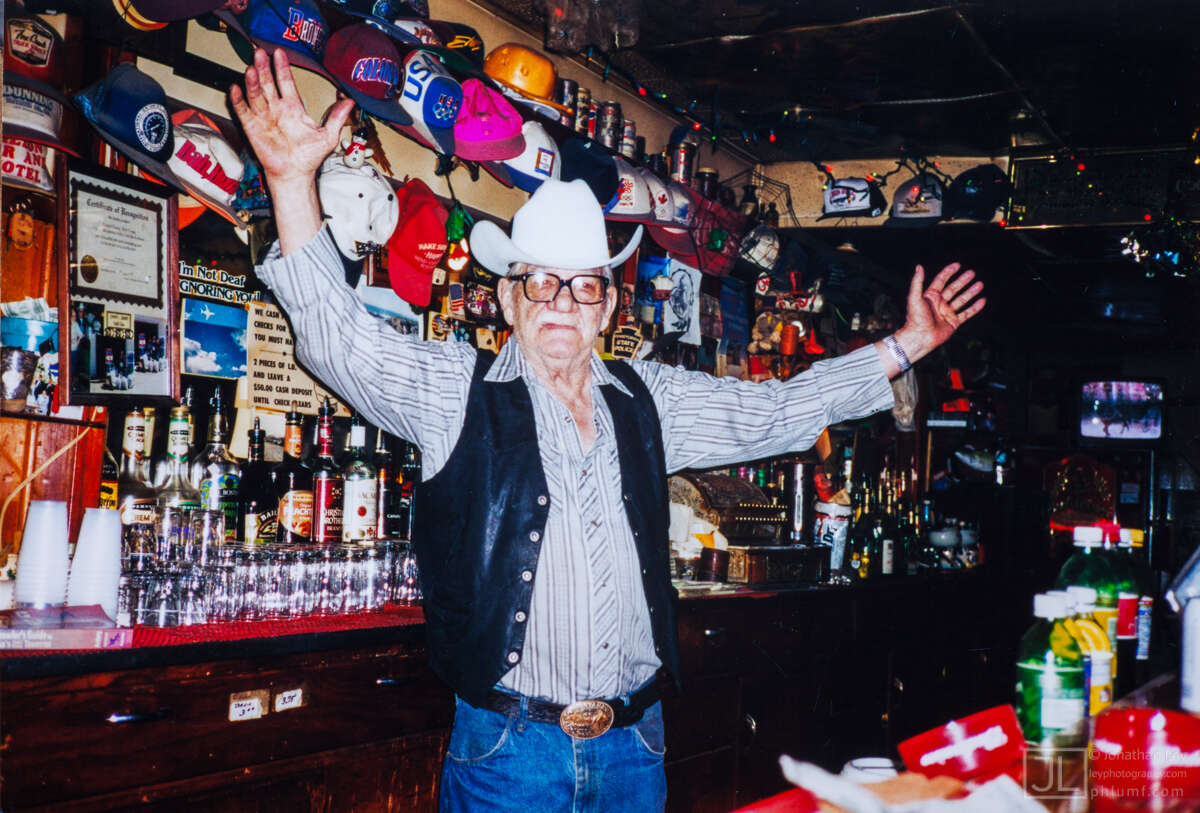
Dave showed up the next morning, severely sunburned but unconcerned about it. He had a pack smaller than a schoolboy’s. He subsisted on twinkies and doritos. I told him about some of the side trips we’d taken in the last section. “Oh, you’re actually looking at stuff?”, he commented. He had a different agenda, for him the CDT was a test of endurance, a race against his own physical limitations. He was trying to average 30 miles per day, including time-off in towns. Todd was doing his best to keep up with him. For them, the trail was work, it was deadlines, “gotta get to ___ by ___”. They’d started 2 weeks after us. I wished them luck.
Mario and I hit the road. It was the busiest highway we’d seen since Butte. Surely, we thought, getting a ride wouldn’t be a problem. But, I didn’t have a hat, Mario had lost his during the ride into town, he’d left it in the back of the pickup. “It is fate”, he’d said as the truck had driven off. Mario’s shoes had been falling apart, and the driver had given Mario a replacement pair, size 8.5.
I knew the lack of hats would be a problem, I didn’t realize how much. Vehicle after vehicle zoomed past, 70, 80, 90 miles per hour. We started walking. It was 15 miles back to the trail. More cars whizzed by, we didn’t even get a sympathetic glance, not even a shrug of the shoulders, which meant… I had no idea what it meant. I hated the shoulder shrug. 3 miles. I hated the highway. 6 miles. I hated the cars. 9 miles. I hated the people driving them. I shouted profanity at the speeding vehicles. I screamed, “You are what’s wrong with society!!!” I jumped up and down. I kneeled on the pavement. I used my other finger. Nothing. We’d given up. Only then, of course, a truck stopped ahead of us. 5 hours and 20 minutes after we’d first hit the road. After 11 miles and about 600 cars, we’d finally gotten ride. “I’ll signal you when we need to get off.”, I shouted from the back of the pickup. We sped onto the highway. 4 miles later, I waved in the rear view mirror. The driver signaled, “I’ll stop at the next exit”. There, he stopped… 2 miles too far.